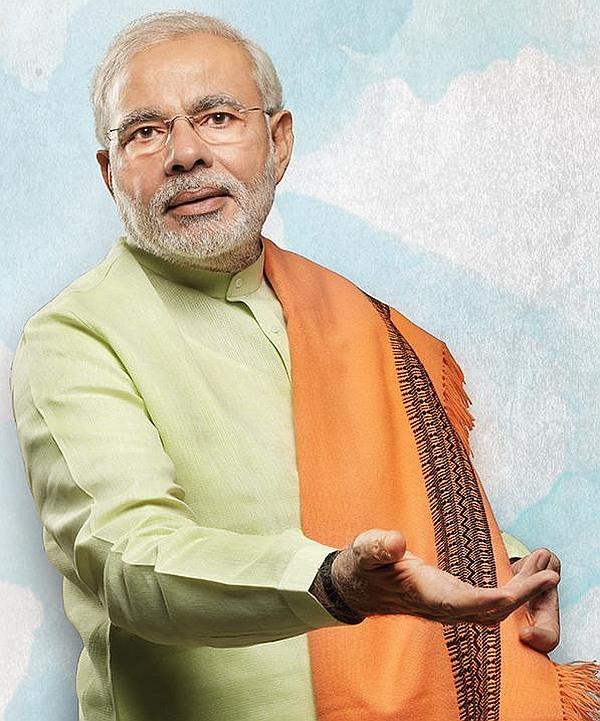
'I believe that India needs inclusive development. We have to pay special attention to those who have been left behind in the race for development. The current arrangements will continue.'
'Besides, we will try to encourage more education among the Muslim community so that they get enough opportunities for employment.'
'We believe that illiteracy is the main reason behind the backwardness of any community. We will empower the minorities with education. We will enhance the skill set of the youths and make them competent. We will encourage them to go in computer education.'
'We will rise above politics and devotedly try to bring the Muslim community on the road to development.'
Bharatiya Janata Party's prime ministerial candidate Narendra Modi dispels doubts about him and his policies in this conversation with Urdu weekly Nai Duniya's Chief Editor Shahid Siddiqui.
What is your concept of secularism?
My definition of secularism is ‘India First’. I believe in giving equal respect to all faiths. The India of my dreams is an India where Hindus, Muslims, Sikhs and Christians -- all live in peace. My path is -- ‘everyone together, everyone’s development’. Our country can only progress if we move forward together.
Will you keep secularism as a part of Constitution or remove it?
The Government of India works according to the Constitution. There is only one holy book for the Indian government, and that is the Constitution. I respect everything that the Constitution says.
When India became independent in 1947, the lawmakers of that time created the Constitution to turn India into a republic.
While creating the world’s largest written Constitution, the visionary leaders and scholars concentrated on every aspect that was important for the unity and integrity of the country, and ensured equal rights to every denomination, sect and religion. This passion for equity can be clearly seen in the Constitution. The word 'secularism' was not used in the Constitution; can anyone doubt the intentions of its creators?
Absolutely not.
What I mean to say is that in a country like India, which has welcomed people from every denomination, sect and religion with an open heart, a country where you have the freedom to embrace any sect, where was the need for an ‘imported’ word like secularism?
Please ...
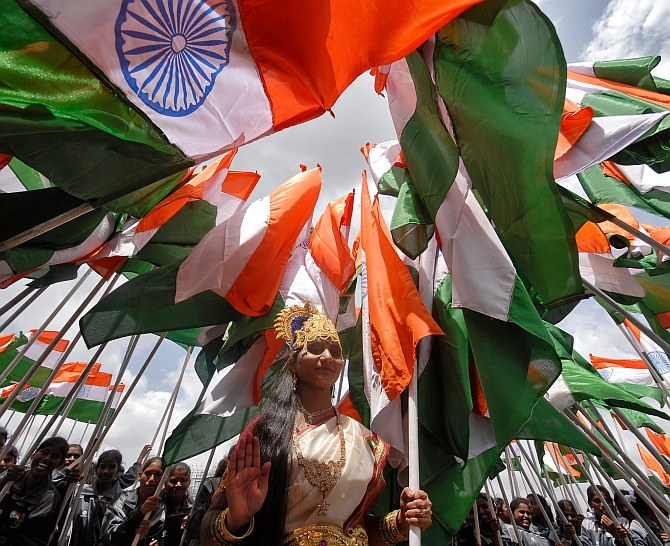
India’s civilisation, culture, history and ideology have always been tolerant. Giving equal respect to all faiths has always been in India’s DNA.
Fifty or 60 years ago, shops used to sell pure ghee easily and undisputedly. No one would have even thought of adulteration in those days. Hence, there was no need to advertise the purity of the ghee. But these days we see ‘pure ghee’ written in large type outside shops, so that the buyer can be assured of the purity of the ghee. What I mean to say is that when something is in its natural state, it does not need advertising. Similarly, there was no practice of using the word ‘secular’ in India.
In my view, secularism is not just a part of the Constitution, but is the unprecedented identity of our country’s thousands-year-old civilisation and culture, which makes us different from other countries.
This word (secularism) has become a pet favourite of the leaders of our country after Independence from the British. Maybe, those who use this word for political gains don’t know that India has always been on a path of secularism. We don’t have a culture of giving preference to a particular religion/sect. For me, it is a subject of belief and a mere word, which is used to garner Muslim votes.
The Congress started using this word and doing politics very cleverly.
In the current scenario, we are seeing that Indian politics is revolving around this word. This is to scare the people; this is to lead them astray, this is to divert peoples’ attention from real issues such as poverty, illiteracy and unemployment.
All parties are scaring the minorities in the name of secularism, they are turning them into a vote bank.
You don't believe in special provisions for anybody on the basis of religion. Will you do away with all provisions and scholarships made for the educational and social uplift of minorities by the United Progressive Alliance government?
I believe that India needs inclusive development. We have to pay special attention to those who have been left behind in the race for development. The current arrangements will continue.
Besides, we will try to encourage more education among the Muslim community so that they get enough opportunities for employment.
We believe that illiteracy is the main reason behind the backwardness of any community. We will empower the minorities with education. We will enhance the skill set of the youths and make them competent. We will encourage them to go in for computer education.
We will rise above politics and devotedly try to bring the Muslim community on the road to development.
Please ...
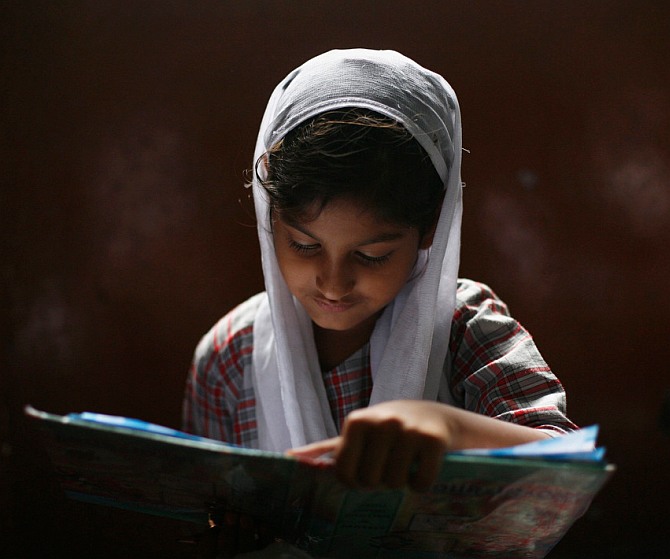
Do you think there is any need for a separate minority affairs ministry?
After Independence, while the new government was being formed, the country’s lawmakers formed many ministries, but there was no talk of a ministry for the minorities, and so it was not done.
The reason was clear; every citizen from every community had equal rights in this country. We never had this tradition of dividing people according to their caste or creed. Pakistan declared itself an Islamic country after Partition, but we didn’t do so. Instead, our then leaders gave an equal status to every community and ensured respect for everyone.
But years later, a separate minorities’ ministry was created. No one knows what the intent was. If betterment was its sole intent, the minorities would not be suffering from their social, economical and educational plight today. After the creation of this ministry, a lot of promises were made, but at the ground level, the situation remained unchanged.
However, I do not want to make this a topic of dispute. I am only saying that problems are not solved merely by the creation of a ministry or a commission; but also passion and bona fide sincerity.
It is regrettable that the leaders of our country have divided the countrymen on the basis of religion, community and caste. I believe that instead of just making symbolic gestures to please a particular community, solid work is needed.
So it is right to say that it will be better if the minority community discusses it among themselves.
Will you do away with institutions such as the Minority Commission, Minority Finance Development Corporation etc?
Empowering the existing constitutional and statutory institutions is more important than doing away with them. It is important that these institutions are given more powers so that they can do solid work, instead of the current system which only makes symbolic gestures.
I would like to tell all those who ask this question, that the Minority Finance Development Corporation in Gujarat has been doing its job very well for the last 12 years.
Please ...
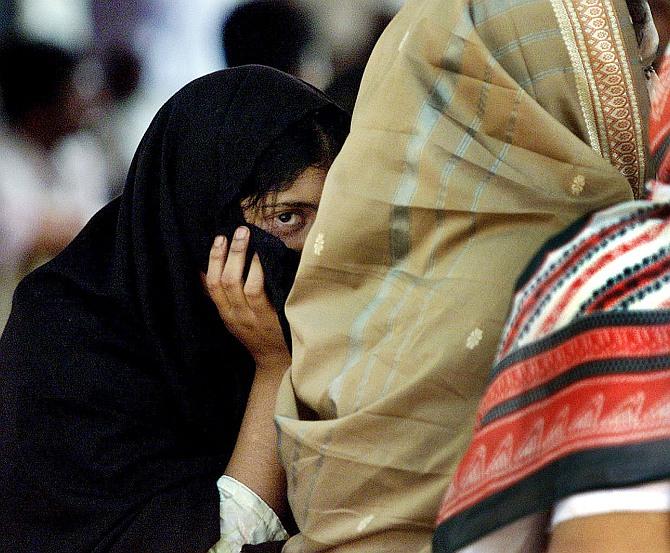
What steps will you take to give confidence to the minorities, especially Muslims, that they will be safe under the new National Democratic Alliance regime?
This is not the first time an NDA government will be formed. The NDA was in power at the Centre for six years, without creating any discrimination or fear.
Similarly, the BJP and its alliance partners have been working successfully for the last 15-20 years in many states.
It is unfortunate that some so-called secular groups are doing the hateful job of creating an ‘unknown’ fear against the BJP among minorities.
But this disinformation will not work for long. The Muslim community is more conscious now. They are not only watching this political ‘drama’, but also understand the conspiracy behind it.
There is propaganda that you will declare India a Hindu Rashtra under pressure from the Rashtriya Swayamsevak Sangh. What is your position on it?
This is disinformation spread by my opponents.
The Republic of India operates according to the spirit of Constitution, and our Constitution provides equal rights to all communities.
Giving special status to a particular community goes against the basic spirit of the Constitution.
Hence, it should be clear that the government will not work according to or for a particular community. For me, the country’s 125 crore residents are all Indians, nothing else.
Please ...

One of the BJP leaders from Bihar recently stated that those who are against Narendra Modi will be sent to Pakistan. What is your take on this?
This statement is utterly irresponsible, and I do not agree with it. It is condemnable. I believe that the well-wishers of the BJP should stay away from such statements. I also request the media not to give so much importance to such statements.
Your campaign is on development but some leaders of the BJP are speaking the language of hate and confrontation. Do you agree with them?
Such assessment of the BJP by the media is unfair. The BJP’s agenda is development; we are the only ones talking about good governance.
I agree that some local leaders and party workers have glib tongues. But it should be commendable that not one of the BJP’s national leaders has indulged in hate-mongering.
In stark contrast, top leaders of the opposition parties are creating a rift in society with their poisonous statements. They are not only leading the people astray, but instigating them against the BJP.
As far as the media is concerned, it will not be wrong to say that a section of the Fourth Estate with malicious intent towards the BJP splashed the controversial statements made by our local leaders, but they forgot to mention that our top leaders are using extremely moderate language throughout the campaigning.
Indian society has suffered long because of caste and religious confrontation. What steps should be taken to reduce it?
I agree with you there. Bigots have only worked towards dividing Indian society on the basis of caste and creed. And this is why, for the first time, a party (the BJP) has talked about creating an ‘Interfaith Consultative Commission’ in its manifesto.
This is very important, and is proof of the BJP’s commitment towards establishing peace, harmony and camaraderie in society.
I believe, that to maintain communal harmony, two things are very important: the first is zero tolerance towards communal violence. Those who disturb communal harmony will be dealt with sternly. The second is establishing a dialogue. We will start a new tradition of establishing communication between the citizens in a multi-cultural, multi-religious and heterogeneous country such as India. Dialogue is necessary to neutralise differences and tiffs.
No governmental action is as effective as a dialogue among civil society. The government will try to establish peace and harmony by taking such solid steps so that our image of ‘unity in diversity’ comes forward and our composite culture remains intact.
Please click NEXT to go further...
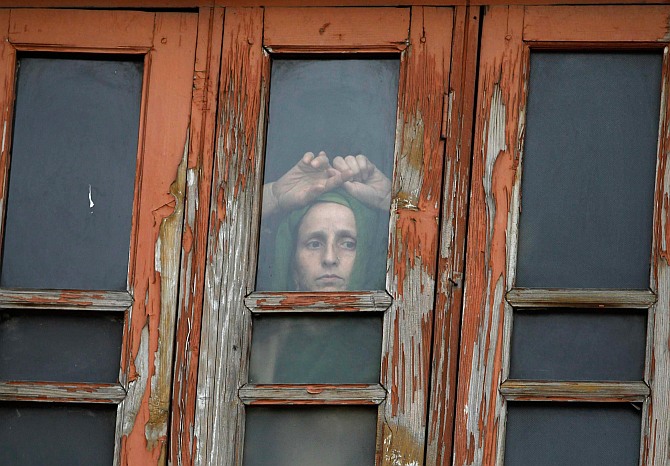
How can we rebuild the trust of Kashmiris in Indian democracy and the Constitution?
Kashmir is an integral part of India. I believe that the people of Kashmir have as much belief in the Constitution as any other citizen of India. Similarly, they have the same rights granted by the Constitution like to any other Indian citizen.
For years, the Kashmir problem has been a big challenge for the country.
In today’s world, there are two main things which need to be done regarding this.
The first is winning the hearts of the Kashmiri people.
These people, who have been living in a state of doubt since the beginning, have to be assured that the country stands with them.
Second, we have to bridge this gulf of mistrust.
We will work towards making the mistrust in the Kashmiri people go away.
We will give good governance to the Kashmiris living under a cloud of maladministration, unemployment, and poverty and make them partners on the road to development with a sense of security.
Besides that, our party intends to take tourism and trade in Kashmir to new heights.
All in all, we will work on the ‘democracy, Kashmiriyat and humanity’ policy imbibed by (former prime minister) Atal Bihari Vajpayee, and will try to make this state into a real paradise.
There is a fear that your hard stance may deteriorate relations with neighbouring countries. What steps will you take to improve relations with Pakistan?
What can I say besides that this is just a flight of fancy?
India and Pakistan have a shared history, a shared heritage. We not only share the same type of food, clothing and language, but the same type of problems such as poverty, poor health and lack of a good education.
So, both nations should first fight the biggest obstacle in the way of progress -- poverty. We will make efforts to have a strong and healthy relationship with not only Pakistan, but other countries as well.
Please ...
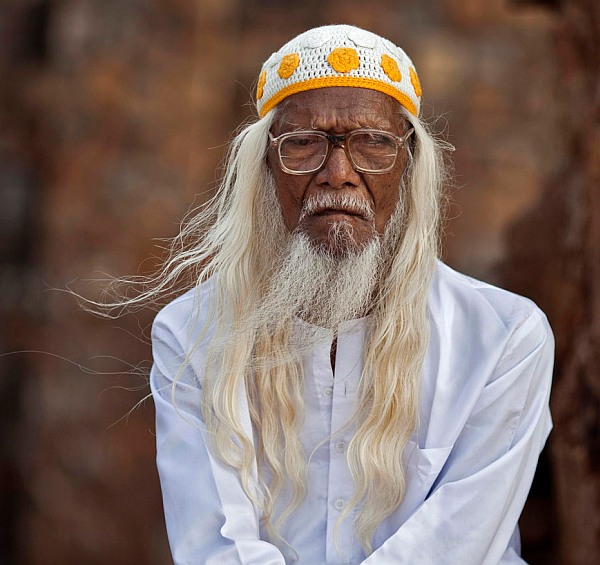
Some people call Urdu a foreign language, but you have launched a blog in Urdu. What steps should be taken to give Urdu its appropriate place in the country of its birth?
Urdu is a very sweet language. This language, which was born in India, has kept us united since centuries.
Beyond the walls of caste and creed, Urdu is the common language of a common Indian. It is prominently used in our movies and songs. It is said that no other language equals Urdu when it comes to expressing love in terms of simplicity and charm.
Urdu literature has given this country some priceless gems such as Ghalib, who have made India proud. From Ghalib to Rahat Indori, Urdu has maintained its rhythm despite difficulties.
These were the reasons I preferred Urdu as the language of my blog, so that I could speak directly to the crores of Urdu lovers in India. I want them to know me and assess my work through my blog. Our government is committed to the development of the Urdu language.
You said 'topi nahi pehnunga magar kisi ki topi bhi nahi uchhalne dunga' (I will not wear the cap, but will not let anyone be insulted either), what do you mean by this statement?
I believe that they should stop politicising the Muslim skull cap. It is condemnable to politicise someone’s faith. I believe that every religion should be respected; every person should be respected. I am against those who politicise in the name of religion.
A Muslim’s cap is for worship, not politics.
Do you have any feeling of bitterness towards the Muslim community, as they are -- by and large -- not voting for the BJP?
I would like to question these kinds of analyses by ‘specialists’.
Saying that Muslims don’t vote for the BJP is utterly wrong.
The kind of mass support we are getting is a testimony that people from all walks of life are with us. There is absolutely no bitterness.
The results of the last assembly election proved that Muslims are with the BJP. This misinformation must stop. This game of leading a particular community astray should stop.
I want to make it clear that if we come to power we will not only work for those who voted for us, but also for those who voted for the opposition, and also for those who didn’t vote at all! We do not differentiate between people on the basis of caste, creed or community.
Please ...
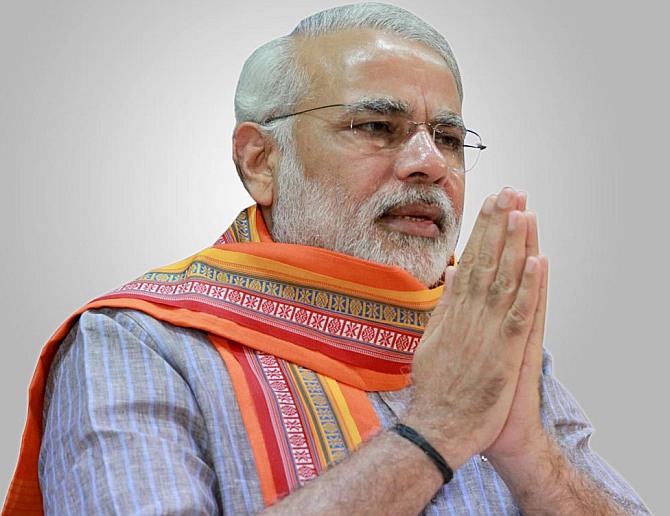
What steps will your government take to bring in a Uniform Civil Code for the country?
Article 44 of the Constitution clearly says that the government should try its best to enact a Uniform Civil Code.
Even the Supreme Court has commented on the government’s inability to do so.
We can see how a small state such as Goa, which has a large population of minorities, has successfully applied a Uniform Civil Code and how it is helping its citizens.
I would also like to clarify that applying a Uniform Civil Code doesn’t mean that a Hindu code should be applied on everyone. I believe that there are many provisions in the Hindu code which are outdated and need improvement.
Hauling the laws made in the 18th century into the 21st century is unnecessary. They hold no relevance in today’s world, and are not acceptable to most of the people.
An important part of this discussion is also women’s rights. In today’s world, it is important that women get equality, independence and the right to take life’s decisions. If we are keeping pace with the times in other things, we should also feel the aura of the 21st century in such matters.
I would suggest that intellectuals and leaders of society hold discussions regarding this. It is important that during this drill, the ideas and traditions of one particular class or individual should not be imposed on another particular class or individual.
Translated from Hindi by Shubir Rishi.